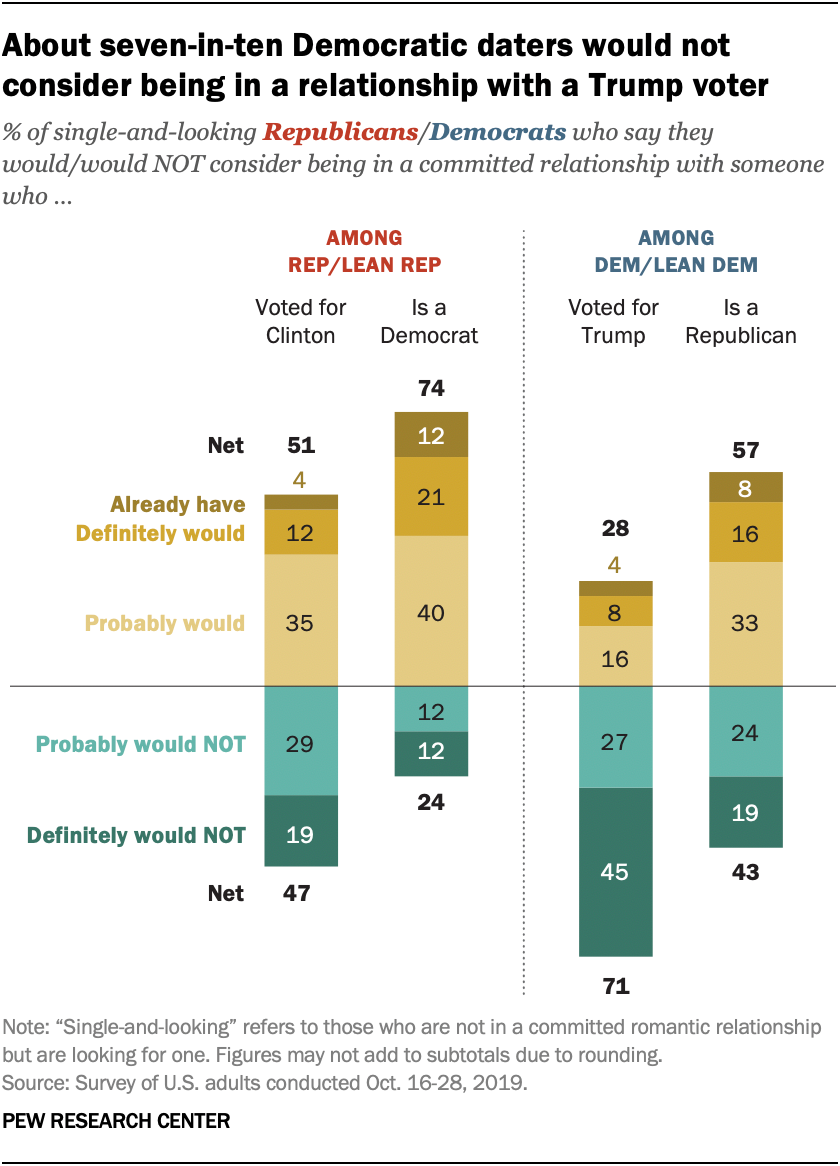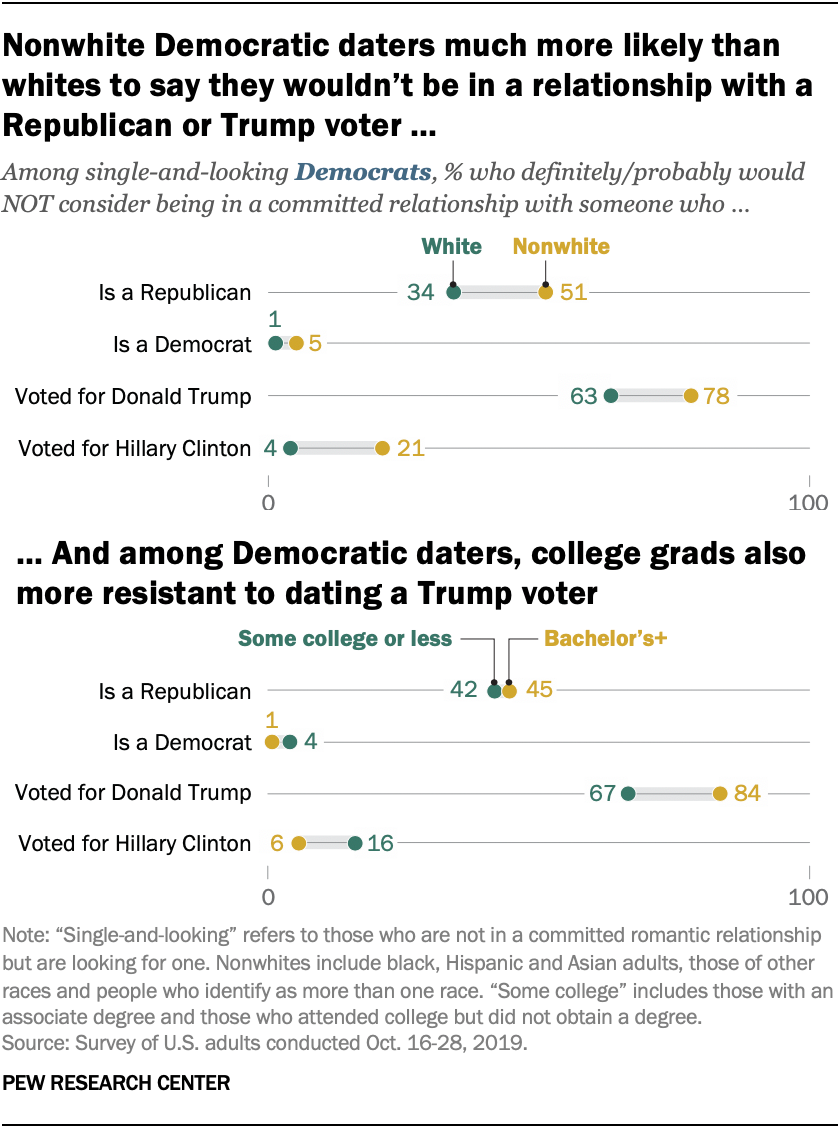 At a time when political polarization and antipathy in the United States remains at modern historic highs, many single people looking for a relationship wouldn’t want to date someone who voted for the candidate of the opposing party in the 2016 presidential election, according to a recent Pew Research Center survey. Democrats are especially wary of dating a Trump voter.
At a time when political polarization and antipathy in the United States remains at modern historic highs, many single people looking for a relationship wouldn’t want to date someone who voted for the candidate of the opposing party in the 2016 presidential election, according to a recent Pew Research Center survey. Democrats are especially wary of dating a Trump voter.
Among Democrats and those who lean toward the Democratic Party who are single but looking for a relationship, about seven-in-ten (71%) say they probably or definitely would not consider being in a committed relationship with someone who voted for Donald Trump. In fact, 45% say they definitely would not consider seriously dating a Trump voter.
Meanwhile, roughly half of single-and-looking Republicans and Republican leaners (47%) say they probably or definitely wouldn’t be in a relationship with someone who voted for Hillary Clinton, including 19% who say they definitely would not consider it. There is also some resistance toward dating someone who is a member of the opposite party – but less so than there is about dating a person who voted for the other party’s 2016 presidential candidate. Roughly four-in-ten single-and-looking Democrats (43%) say they would not consider being in a relationship with a Republican. About a quarter of Republicans who are looking for a relationship (24%) say they probably or definitely would not seriously date a Democrat.
This analysis focuses on the dating preferences of single-and-looking Americans by political party. These findings are based on a survey conducted Oct. 16 to 28, 2019, among 4,860 U.S. adults. This includes those who took part as members of Pew Research Center’s American Trends Panel (ATP), an online survey panel that is recruited through national, random sampling of residential addresses, as well as an oversample of respondents from Ipsos’s KnowledgePanel who indicated that they identify as lesbian, gay or bisexual. (The Ipsos Knowledge Panel is an online survey panel that is recruited through national, random sampling.)
Due to the small sample size, we were not able to analyze any demographic groups among Republicans who are looking for a relationship. Also due to the small sample size, we were not able to analyze black and Hispanic adults separately among single-and-looking Democrats.
Recruiting ATP panelists by phone or mail ensures that nearly all U.S. adults have a chance of selection. This gives us confidence that any sample can represent the whole U.S. adult population (see our Methods 101 explainer on random sampling). To further ensure that each ATP survey reflects a balanced cross-section of the nation, the data is weighted to match the U.S. adult population by gender, race, ethnicity, partisan affiliation, education and other categories.
Here are the questions used for this report, along with responses, and its methodology.
The aversion to dating people of different political orientations reflects the partisan antipathy seen in the overall public. Other recent Pew Research Center surveys have found that sizable shares of partisans are likely to associate negative traits such as “closed-minded” and “immoral” with members of the opposite political party, and many find it stressful and frustrating to talk about politics with people who don’t share their political views.
See also: It’s harder for Clinton supporters to respect Trump backers than vice versa
For the most part, partisans are very likely to say they would consider being in a relationship with someone of their own party or who voted for their party’s 2016 candidate. Even so, 13% of Democrats say they would not consider being in a relationship with someone who voted for Hillary Clinton. This compares with only 5% of Republicans who say the same about someone who voted for Donald Trump.
This analysis is based on survey respondents who reported that they are not in a committed romantic relationship and who responded that (1) they are looking for a committed romantic relationship only, or (2) they are looking for either a committed romantic relationship or casual dates at the time the survey was taken. This group of people is referred to interchangeably as “single-and-looking,” “looking for a relationship” or “daters.” Singles who said that they are not currently looking for a relationship or dates, or that they are looking for only casual dates, were not asked whether they would consider being in a relationship with someone with the given characteristics.
Demographic differences

- Among Democratic daters, willingness to date someone on the other side of the partisan divide differs by race and education. (The sample size of Republican daters is too small to analyze differences between demographic subgroups.) Single-and-looking Democrats who identify as some race or ethnicity other than white are more likely than their white counterparts to say they would not consider getting into a relationship with a Trump voter (78% of nonwhites say this, compared with 63% of whites) or a Republican (51% vs. 34%). However, nonwhite Democratic daters are also significantly more likely to say they wouldn’t consider being in a relationship with a Clinton voter (21% vs. 4%).
- Democratic daters with at least a bachelor’s degree are more likely than those with some college experience or less education to say they would not be in a relationship with someone who voted for Trump in 2016 (84% vs. 67%). In turn, Democratic daters without a college degree are more likely than those with a bachelor’s degree or more education to say they wouldn’t be in a relationship with a Clinton voter (16% vs. 6%). There are no significant differences by education when it comes to those who would consider seriously dating a Republican or Democrat.
- Single-and-looking Democrats who consider themselves liberal or very liberal are more likely than those who consider themselves moderate, conservative or very conservative to say they would not consider being in a relationship with a Trump voter (78% of liberal Democrats vs. 63% among moderate and conservative Democrats) or a Republican (53% vs. 31%).
- While there are few differences by gender, single-and-looking Democratic men are about twice as likely as single-and-looking Democratic women to say they wouldn’t get into a relationship with a Clinton voter (17% vs. 9%). There are no notable differences by age among Democratic daters.
It’s worth noting that Democratic daters far outnumber Republican daters: Among singles looking for a relationship in this survey, 62% are Democrats or lean Democratic and 36% are Republicans or Republican leaners. Among all respondents in the same survey, the shares are 52% and 44%, respectively.
Note: Here are the questions used for this report, along with responses, and its methodology.



